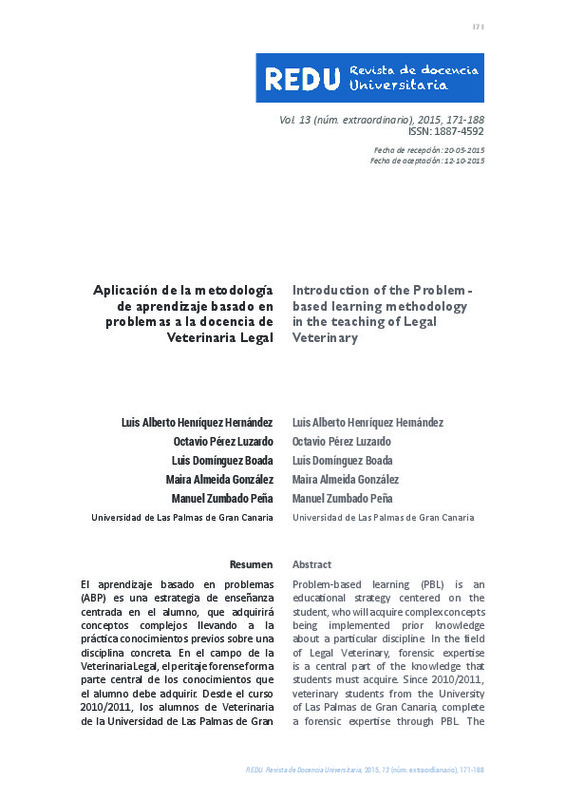Albanese, M.A., Mitchell, S. (1993). Problem-based learning: A Review of literature on its outcomes and implementations issues. Academic Medicine, 68, 52-81. https://doi.org/10.1097/00001888-199301000-00012
Aspy, D.N., Aspy, C.B., Quimby, P.M. (1993). What Doctors Can Teach Teachers about Problem-Based Learning. Educational Leadership, 50, 22-24.
Barrows, H.S. (1971). Simulated Patients (programmed patients). The development and use of a new technique in medical education. C.C. Thomas: Springfield, USA.
[+]
Albanese, M.A., Mitchell, S. (1993). Problem-based learning: A Review of literature on its outcomes and implementations issues. Academic Medicine, 68, 52-81. https://doi.org/10.1097/00001888-199301000-00012
Aspy, D.N., Aspy, C.B., Quimby, P.M. (1993). What Doctors Can Teach Teachers about Problem-Based Learning. Educational Leadership, 50, 22-24.
Barrows, H.S. (1971). Simulated Patients (programmed patients). The development and use of a new technique in medical education. C.C. Thomas: Springfield, USA.
Barrows, H.S. (1986). A taxonomy of problem-based learning methods. Medical Education, 20, 481-486. https://doi.org/10.1111/j.1365-2923.1986.tb01386.x
Barrows, H.S. (1993). An overview of the uses of standardized patients for teaching and evaluating clinical skills. Academic Medicine, 68, 399-405. https://doi.org/10.1097/00001888-199306000-00002
Barrows, H.S., Tamblyn, R. (1980). Problem-Based Learning: An Approach to Medical Education. Springer Series on Medical Education Vol 1, Springer Publishing Company: New York.
Biggs, J.B. (2005). Calidad del aprendizaje universitario. Narcea: Madrid.
Blumberg, P., Michael, J.A. (1992). Development of self-directed learning behaviors in a partially teacher-directed problem-based learning curriculum. Teaching and Learning in Medicine, 4, 3-8. https://doi.org/10.1080/10401339209539526
Bridges, E.M., Hallinger, P. (1991). Problem-Based Learning in Medical and Managerial Education. Paper presented for the Cognition and School Leadership Conference of the National Center for Educational Leadership and the Ontario Institute for Studies in Education, Nashville, USA.
Dochy, F., Segers, M., Van den Bossche, P., Gijbels, D. (2003). Effects of Problem-Based Learning: A Meta-Analysis. Learning and Instruction, 13, 533-568. https://doi.org/10.1016/S0959-4752(02)00025-7
Farnsworth, C.C. (1994). Using Computer Simulations in Problem-Based Learning. En M. Orey (Ed.), Proceedings of the Thirty-fifth ADCIS Conference. Nashville, USA: Omni Press.
Gallagher, S.A., Stepien, W.J., Rosenthal, H. (1992). The Effects of Problem-Based Learning on Problem Solving. Gifted Child Quarterly, 36, 195-200. https://doi.org/10.1177/001698629203600405
Lane, E.A. (2008). Problem-Based Learning in Veterinary Education. Journal of Veterinary Medical Education,35, 631-636. https://doi.org/10.3138/jvme.35.4.631
Mennin, S.P., Friedman, M., Skipper, B., Kalishman, S., Snyder, J. (1993). Performances on the NBME I, II, and III by Medical Students in the Problem-Based Learning and Conventional Tracks at the University of New Mexico'. Academic Medicine, 68, 616-624. https://doi.org/10.1097/00001888-199308000-00012
Morales, P., Landa, V. (2004). Aprendizaje basado en problemas, Theoria, 13, 145-157.
Norman, G.R., Schmidt, H.G. (1992). The Psychological Basis of Problem-Based Learning: A Review of the Evidence. Academic Medicine, 67, 557-565. https://doi.org/10.1097/00001888-199209000-00002
Pincus, K.V. (1995). Introductory Accounting: Changing the First Course. New Directions for Teaching and Learning, 61, 88-98. https://doi.org/10.1002/tl.37219956112
Vernon, D.T., Blake, R.L. (1993). Does Problem-Based Learning Work?: A Meta-Analysis of Evaluative Research. Academic Medicine, 68, 550-563. https://doi.org/10.1097/00001888-199307000-00015
[-]








